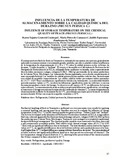Influencia de la temperatura de almacenamiento sobre la calidad química del durazno (Prunus Persica L.)

View/
Date
2015-01Palabras Clave
Refrigeración, Calidad postcosecha, AlmacenamientoRefrigeration, Postharvest quality, Storage
Metadata
Show full item recordAbstract
El manejo postcosecha de las frutas en Venezuela es realizado de una manera muy precaria, generalmente aplicando un manejo mínimo y ocasionando grandes pérdidas, por ello se planteó evaluar la influencia de la temperatura de almacenamiento (4 y 10 ± 1 ºC) sobre la calidad química en dos cultivares de durazno: ‘Criollo Amarillo’ y ‘Jarillazo’. El ensayo se desarrolló en el laboratorio de Postcosecha del Postgrado de Horticultura de la UCLA, utilizando frutos uniformes en tamaño, color y aparentemente libre de daños mecánicos y plagas, categoría II (86,4 - 106,4 g) provenientes de las zonas productoras de la Colonia Tovar, Edo Aragua. Los tratamientos fueron organizados en un diseño completamente al azar con arreglo factorial. Las variables de calidad química fueron medidas cada tres días, hasta alcanzar una calidad no aceptable comercialmente. Los sólidos solubles totales presentaron valores promedios de (14,77 - 14,85 ºBrix) sin diferencias significativas debida a los tratamientos. La acidez total titulable presentó mayores valores a 4 ºC, sin observar diferencias significativas entre los cultivares y con una disminución gradual a través del tiempo. Se observo un pH mayor a 10 ºC sin diferencias del mismo entre cultivares. La concentración de acido ascórbico no presentó diferencias significativas, sin embargo al transcurrir el tiempo ocurrió una disminución del contenido de vitamina C. La mejor temperatura de almacenamiento en frutos de duraznero fue de 4 ºC, permitiendo una mejor preservación de la calidad química durante 18 días con respecto a aquellos sometidos a 10 ºC.
Collections
Información Adicional
| Otros Títulos | Influence of storage temperature on the chemical quality of peach (Prunus Persica L.) |
| Correo Electrónico | uzcateguikrn@hotmail.com mariap@ucla.edu.ve |
| ISSN | 1690-3226 |
| Resumen en otro Idioma | Postharvest handling of fruits in Venezuela is performed in a very precarious way, usually by applying a minimal handling and causing great losses therefore aim was to evaluate the influence of storage temperature (4 and 10 ± 1 º C) on the chemical quality two peach cultivars: ‘Yellow Creole’ and ‘Jarillazo’. The test was developed in the laboratory of Postharvest Horticulture Graduate of UCLA, using uniform fruit size, color and apparently free from mechanical damage and pests, category II (86.4 to 106.4 g) from the producing areas Colonia Tovar, Edo Aragua. Treatments were arranged in a completely randomized design with factorial arrangement. The chemical quality variables were measured every three days until a non commercially acceptable quality. Total soluble solids showed average values o f (14.77 to 14.85 ° Brix) with no significant differences due to treatments. The total titratable acidity showed the highest values a t 4 ° C, no significant differences observed between cultivars and a gradual decrease over time. A pH higher than 10 ° C without differences among cultivars thereof was observed. The concentration of ascorbic acid was not significantly different, however as time passed was a decrease of vitamin C. The best temperature storage of peach fruit was 4 º C, allowing better preservation of the chemical quality for 18 days compared to those subjected to 10 ° C. |
| Colación | 65-73 |
| Periodicidad | Semestral |
| País | Venezuela |
| Institución | Universidad de Los Andes |
| Publicación Electrónica | Academia |
| Sección | Academia: Artículos de Investigacion |





